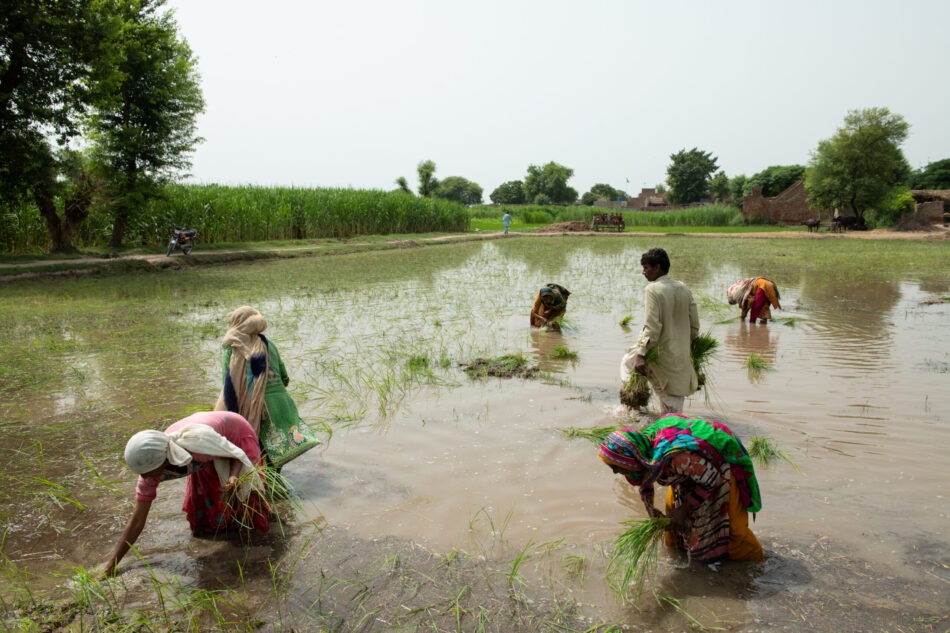By Mohsin Hafeez

Today we are celebrating International Women’s Day (IWD) with the theme of “Invest in Women – Accelerate Progress.” While IWD allows us to celebrate the achievement of women across various sectors, it is also a reminder of the work that remains in achieving gender equality. In Pakistan, this day holds particular significance for highlighting the valuable contributions of women in the water and agriculture sectors.
Agriculture – and women – remain the backbone of Pakistan’s economy. The sector employs a significant portion of the population, approximately 68% women, compared with only 28% men. However, women’s roles often go unrecognized, and they face numerous barriers in accessing resources, knowledge, and decision-making power. It is also important to note that more than 50% of women are classified as contributing family workers – compared to around 10% of men – whose contributions are often unpaid and undervalued, underscoring broader patterns of systemic gender inequality.
Economic empowerment remains a fundamental aspect of women’s empowerment. While there has been some progress in women’s participation in the agricultural workforce, they still face barriers such as wage gaps, limited access to credit and technology, and lack of representation in leadership positions. Initiatives promoting capacity building for both agricultural workers and relevant government departments can play a pivotal role in unlocking the economic potential of Pakistani women, and the country at large.
Recognizing the critical intersection of gender and agriculture, the International Water Management Institute (IWMI) has been at the forefront of efforts to promote gender equality and social inclusion in the agriculture and water sectors in Pakistan. Through research, capacity building, and advocacy, IWMI is working to ensure that women are empowered and supported as key stakeholders in water management and agricultural development.
IWMI, with support from UKaid, is leading the Water Resource Accountability in Pakistan (WRAP) program to address water challenges at district, provincial and federal level. The program adopts a gender transformative approach in project activities. Recognizing the need of awareness and sensitization of gender and social inclusion in the water/agriculture sector, capacity building trainings have been organized with key government institutions, Water User Associations (WUAs) and farmers at district, province and federal level. We have even published a guiding document for practitioners to help them better integrate gender and social inclusion into integrated water resources management and planning.
To help improve women’s agricultural capacity and bridge the technology gap, IWMI’s gender team has also led various training sessions on climate-smart irrigation technologies with progressive female farmers and small-scale agricultural workers. One progressive female farmer, a dynamic woman who owns around 50 acres of land, employs around 25 female farmers in District Okara, Punjab. She manages all her agricultural activities and makes all financial decisions by herself. The techniques she learned during the training helped her improve her irrigation scheduling. IWMI efforts have also strengthened her confidence, leading her to join the technical Working Groups established by IWMI under the project. Similar trainings have also been conducted women in DI Khan under the USAID-funded Water Management for Enhanced Productivity activity.
In addition to improving women’s access to agriculture technologies, under the Fragility, Conflict and Migration Initiative, IWMI is also examining digital inequalities and exploring the role of social media and other tools in building community resilience and anticipatory action. During disasters, marginalized groups like women and children are more vulnerable due to inefficient planning and strategies, exacerbated by existing inequalities. An in-depth survey with climate migrant communities in Rahim Yar Khan found that access to information, social media, and early warning systems is inequitable. Cultural restrictions, coupled with illiteracy, lead to many women in under-developed areas barred from being able to own or use mobile phones. These restrictive norms can severely impede women’s access to information and reduce their capacity to communicate with others and ensure their own personal safety, especially during emergency situations.
These activities provide an overview of IWMI Pakistan’s commitment to promoting gender equality. Investing in women can unleash the full potential of Pakistan’s agricultural sector and drive sustainable economic growth. As we celebrate International Women’s Day and reflect on the progress made, let us commit to further empowering women in water and agriculture. By breaking down barriers, providing access to resources and technology, and fostering an inclusive environment, we can ensure that every woman in Pakistan has the opportunity to thrive and contribute to the country’s prosperity. Through our ongoing efforts and partnerships, we remain dedicated to advancing women’s empowerment and creating a brighter future for all.
Kanwal Waqar, Sidra Khalid, and Maryam Rehman also contributed to this article.
This article originally appeared on www.nation.com.pk


